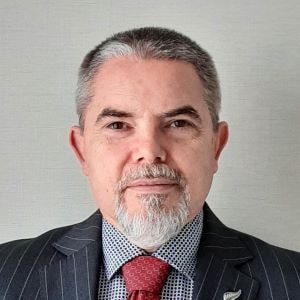
Tim Given has a Graduate Diploma of Applied Theology from Carey Baptist Theological College. Tim joined the Ministry of Foreign Affairs and Trade (MFAT) as a policy officer in November 2017. In February 2021 he was posted to Manila, as Deputy Ambassador for the New Zealand Embassy to the Philippines. We asked Tim to tell us about his work and how it forms part of his worship to God.
You were a missionary kid, went to Bible college and expected to become a missionary. So what led you ultimately into policy work and the diplomatic service?
After leaving school and working in electronics research and design for about five years, I went to the World View Centre for Intercultural Studies in Tasmania, run by WEC. I came out of that with the intention of full-time ministry.
I married my wife Julia at the end of Bible college. She was just finishing off med school. We expected that within a few years we’d be overseas as missionaries. But it just never happened. We kept on feeling God telling us that we should be supporters and senders and we weren’t to go yet.
So for the next 22 years I worked in church and parachurch organisations. Nineteen of those years were in Hamilton, at Hamilton South Baptist Church. And for 15 of those years I was a stay-at-home dad, so I did the majority of raising our four children while Julia earned the bread and butter.
When our youngest started school the question was whether I was going to go into full-time ministry or do something else. Once I decided I wasn’t going to do full-time ministry, then the question was what I was going to do, because I would have to retrain no matter what. Julia and I spent about three months discussing it and started talking about policy as an option.
As I look back, it was something I had done all through my life, but particularly with the health and safety regulation changes. I was on school and church boards, and the health and safety law change was being put forward. I was involved in submissions regarding that law, and in making sure that both the church and the school had the required policies in place.
So I did my Bachelor and Masters in Social Science – Public Policy and joined MFAT as a policy officer level one, i.e. at the bottom. I was 48 at the time, but coming in as a new graduate.
Now I am posted in Manila and I will be there until May 2024. Posting is an application process. It wasn’t at all guaranteed that I would be going out to a posting but here I am. I found the whole experience incredibly stretching—a very different change of perspective in life and role and how you might serve the Lord. It has been fast and furious growth and it is still going on with a vengeance.
How do you integrate your Christian faith and your diplomatic work?
My role is to represent the New Zealand Government. So sometimes I am saying, “I am holding to this position because it is the position of the New Zealand Government, and my personal feelings on the matter are not relevant.”
I take a lot of comfort from the prophet Daniel. He was there across five kings and there is no way those kings were always making decisions that were in line with what God had told the people of Israel about how they should live their lives. And yet he was recognised as someone who was spotless in their work.
Jesus is my Lord, so my character and my integrity, the way I treat people around me, the way I go about my business, that’s in accordance with Christ. It is conceivable that one day the government might want me to do something and Christ says, “You can’t do that,” and then I have to make a choice. But that hasn’t happened yet.
There are strong followers of Christ in senior positions in MFAT and they have walked this journey for many years. It’s good to talk with those people about areas that might be conflicting and ask how they navigated it and what position they took.
Do you see your work as an act of worship? If so, how does that affect the way you work?
The assumptions we bring to this question are a large part of the journey I have been on. In our Christian circles we regularly talk as if we have to cloak an ‘ordinary’ job, i.e. anything outside of the church building, with spiritual language to make it appear spiritual. But it simply is spiritual because I can’t turn my spirit on and off.
My daily work is an act of worship to God whether I see it as such, intend it as such, or not, because my relationship with Jesus is visible in the character I exhibit in my role. The manner in which I relate to those around me is the worship I offer. I am hugely aware of whether I am using my words to bring life or to steal, kill and destroy. This changes how I go about correcting, rebuking and training people in the job.
My awareness of how gracious God is in accepting me, regardless of his plans/desires to change and grow me, alters how I relate to my counterparts from other nations. I try to see them through their own lens, to see where they are coming from. The security I have in who I am in Jesus also allows me to hear what the other person has to say without being defensive.
Any other thoughts about work and worship?
We don’t have to look for work to do for God. Absolutely, as we walk with him he will guide us towards the good works he’s prepared in advance for us to do. As with myself, that may look different from anything we imagined doing with God. But the ‘with’ and the ‘for’ are the keys. Trying to do things for God is a dead end. It only leads to grief.
If we are with Jesus in our activities, whatever they are, his character will show in our doing. “Everything you do, do it as unto the Lord” doesn’t mean ‘work harder’. It means love, joy, peace, patience, kindness, goodness, gentleness, faithfulness and self-control are evident in whatever we are doing. That will likely lead us towards doing our role well, but the pursuit of excellence is not how we get there. The pursuit of the character of Jesus is how we get there.
How has your Carey study helped you in your MFAT work?
Being a diplomat and being a pastor has a lot of crossover. There is pastoral care and the need to manage your time, the demands of people around you and the expectation that you are always available. And sometimes when you are on a post you are always available because anybody can ring you at any time in an emergency. The challenge of managing myself and others in the context means the paper I draw on the most is probably the one I did on introduction to management.
Would you recommend theological training to others not in ministry?
I think it is worthwhile for every Christian to do some theological study because when you are sitting in your church it is easy to end up with a blinkered view of the scriptures, of what it means to follow Christ and of expressions of faith. Study begins to pull apart those assumptions.
What’s next for you?
In the short-term my goal is to get across all the things that are going on in the embassy until I can be the person who can manage the running of the embassy.
Long-term, like retirement, I can see myself taking skills, life experience, work in the church, diplomatic work and putting that together in some sort of pastoral care role, or something in the church amongst pastoral staff, or being in an interim pastoral role.
Where I am going to go while I am still working is a really interesting question. I could potentially become an ambassador in one of our smaller posts. I don’t have an ambition as such. I would probably put my hat in the ring but I didn’t go into this to prove anything. It is like God slowly pulled open the veil and said, “Hey, guess what, there is this enormous thing out there that you could be doing, and I would love to have you in this place doing it.”

0 Comments